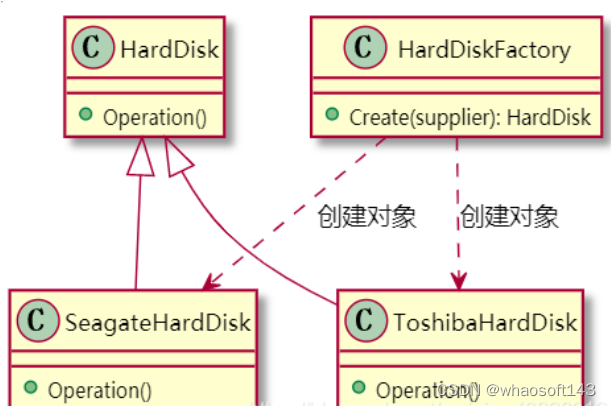自己很low啊都是给自己看的
一、简单工厂方法
简单工厂方法定义一个用于创建对象的类,该类接受一个参数,通过参数决定创建不同的对象。
GOF并没有把简单工厂方法定义为23种设计模式之一,可以认为简单工厂方法是工厂方法的简化形式。
为了体现简单工厂方法和工厂方法的区别和联系,此处把简单工厂方法先单独讲一下。
模拟场景
假设你要生产电脑,电脑由硬盘、内存条、CPU、主板的部件组成。你为了保证供应链可靠,每种部件都选择了至少两家供应商。比如:
硬盘供应商 seagate、Toshiba
内存条供应商 SAMSUNG、Crucial
CPU供应商 intel、AMD
主板供应商 intel、AMD
此处列出多个部件是为了后面讲解工厂方法、抽象工厂方法时使用同一个模拟场景。本章讲简单工厂方法暂时不需要涉及这么多部件,所以仅以硬盘这一个部件为例进行讲解。
实现的思路
硬盘就是要创建的对象(即:产品)。为了让不同供应商提供的硬盘可以通用,要定义一个硬盘产品类,并让不同供应商的硬盘都继承硬盘产品类的接口。
还需要定义一个创建硬盘对象的类(即:工厂)。工厂类根据参数决定创建哪家供应商的硬盘对象。
实现硬盘对象创建
参与者:
(1)Product: HardDisk 定义硬盘对象的接口
(2)Concrete Product: SeagateHardDisk, ToshibaHardDisk 实现不同供应商的硬盘
(3)SimpleFactory: HardDiskFactory 根据参数,创建不同供应商的硬盘对象
UML:

HardDisk代码示例:
hard_disk.h:
#ifndef HARD_DISK_H#define HARD_DISK_Hstruct HardDisk {void (*Operation)(struct HardDisk *this);};#endif
SeagateHardDisk代码示例:
seagate_hard_disk.h:
#ifndef SEAGATE_HARD_DISK_H#define SEAGATE_HARD_DISK_H#include "hard_disk.h"struct SeagateHardDisk {struct HardDisk hardDisk;};// 构造函数void SeagateHardDisk(struct SeagateHardDisk *this);// 析构函数void _SeagateHardDisk(struct SeagateHardDisk *this);#endif
seagate_hard_disk.c:
#include "seagate_hard_disk.h"#include "stdio.h"void SeagateOperation(struct SeagateHardDisk *this){printf("这是 Seagate 硬盘\n");}void SeagateHardDisk(struct SeagateHardDisk *this){this->hardDisk.Operation = (void(*)(struct HardDisk *))SeagateOperation;}void _SeagateHardDisk(struct SeagateHardDisk *this){this->hardDisk.Operation = NULL;}
ToshibaHardDisk代码示例:
toshiba_hard_disk.h:
#ifndef TOSHIBA_HARD_DISK_H#define TOSHIBA_HARD_DISK_H#include "hard_disk.h"struct ToshibaHardDisk {struct HardDisk hardDisk;};// 构造函数void ToshibaHardDisk(struct ToshibaHardDisk *this);// 析构函数void _ToshibaHardDisk(struct ToshibaHardDisk *this);#endif
toshiba_hard_disk.c:
#include "toshiba_hard_disk.h"#include "stdio.h"void ToshibaOperation(struct ToshibaHardDisk *this){printf("这是 Toshiba 硬盘\n");}void ToshibaHardDisk(struct ToshibaHardDisk *this){this->hardDisk.Operation = (void(*)(struct HardDisk *))ToshibaOperation;}void _ToshibaHardDisk(struct ToshibaHardDisk *this){this->hardDisk.Operation = NULL;}
HardDiskFactory代码示例:
hard_disk_factory.h:
#ifndef HARD_DISK_FACTORY_H#define HARD_DISK_FACTORY_H#include "hard_disk.h"enum HARD_DISK_SUPPLIER_E {HARD_DISK_SUPPLIER_SEAGATE,HARD_DISK_SUPPLIER_TOSHIBA};struct HardDiskFactory {struct HardDisk* (*Create)(struct HardDiskFactory *this,enum HARD_DISK_SUPPLIER_E supplier);void (*Destroy)(struct HardDiskFactory *this,struct HardDisk* hardDisk);};// 构造函数void HardDiskFactory(struct HardDiskFactory *this);// 析构函数void _HardDiskFactory(struct HardDiskFactory *this);#endif
hard_disk_factory.c:
#include "hard_disk_factory.h"#include "seagate_hard_disk.h"#include "toshiba_hard_disk.h"#include "stdio.h"#include "stdlib.h"struct HardDisk *Create(struct HardDiskFactory *this,enum HARD_DISK_SUPPLIER_E supplier){switch (supplier) {case HARD_DISK_SUPPLIER_SEAGATE:{struct SeagateHardDisk *seagateHardDisk = NULL;if ((seagateHardDisk = malloc(sizeof(struct SeagateHardDisk))) == NULL) {printf("fail in malloc\n");return NULL;}SeagateHardDisk(seagateHardDisk);return (struct HardDisk *)seagateHardDisk;}case HARD_DISK_SUPPLIER_TOSHIBA:{struct ToshibaHardDisk *toshibaHardDisk = NULL;if ((toshibaHardDisk = malloc(sizeof(struct ToshibaHardDisk))) == NULL) {printf("fail in malloc\n");return NULL;}ToshibaHardDisk(toshibaHardDisk);return (struct HardDisk *)toshibaHardDisk;}default:printf("未知的供应商\n");return NULL;}}void Destroy(struct HardDiskFactory *this, struct HardDisk* hardDisk){if (hardDisk != NULL) {free(hardDisk);}}// 构造函数void HardDiskFactory(struct HardDiskFactory *this){this->Create = Create;this->Destroy = Destroy;}// 析构函数void _HardDiskFactory(struct HardDiskFactory *this){this->Create = NULL;this->Destroy = NULL;}
客户端代码示例:
#include "hard_disk.h"#include "hard_disk_factory.h"#include "stddef.h"void main(){struct HardDisk *hardDisk = NULL;struct HardDiskFactory hardDiskFactory;HardDiskFactory(&hardDiskFactory);// 创建 seagate 硬盘对象hardDisk = hardDiskFactory.Create(&hardDiskFactory, HARD_DISK_SUPPLIER_SEAGATE);// 使用 seagate 硬盘对象hardDisk->Operation(hardDisk);// 销毁 seagate 硬盘对象hardDiskFactory.Destroy(&hardDiskFactory, hardDisk);// 创建 toshiba 硬盘对象hardDisk = hardDiskFactory.Create(&hardDiskFactory, HARD_DISK_SUPPLIER_TOSHIBA);// 使用 seagate 硬盘对象hardDisk->Operation(hardDisk);// 销毁 toshiba 硬盘对象hardDiskFactory.Destroy(&hardDiskFactory, hardDisk);_HardDiskFactory(&hardDiskFactory);}
客户端显示示例:
./hard_disk这是 Seagate 硬盘这是 Toshiba 硬盘
whaosoft aiot http://143ai.com